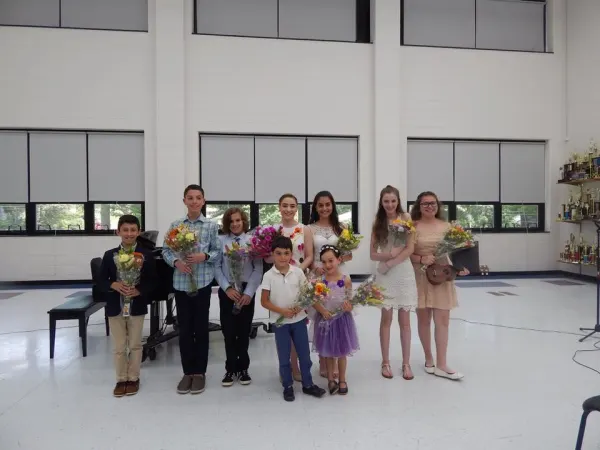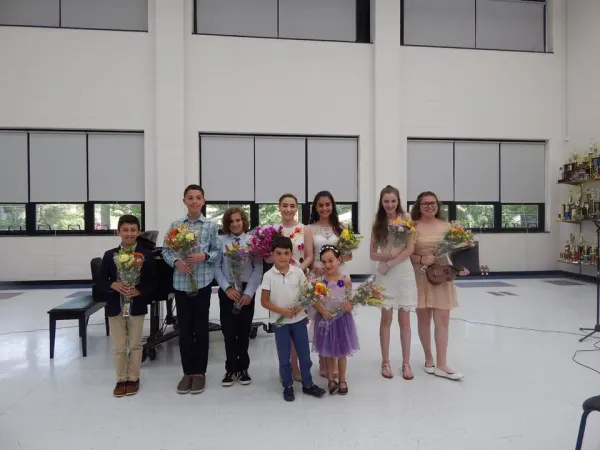Sardo Music Lessons
About
My name is Demetria, and I am a private music instructor! I have been teaching a variety of music lessons to students of all ages for six years now. I teach piano, voice, ukulele, and music theory, in a wide range of levels and styles!
I have a BA in Music Therapy from Montclair State University, and am working on completing my MA in Music Therapy from MSU. I hold my MT-BC credential (Board-Certified Music Therapist), and have years of experience working with children in schools, special education settings, and hospital/medical settings.
As a music therapist, and a music instructor, I place the highest value on developing a love for, and a relationship with music. I take student music preference into consideration when planning lessons and choosing repertoire. In addition to making beautiful music, learning an instrument often also means furthering reading and listening skills, learning patience and determination, and developing a greater sense of empathy. I hold all of these goals to the same importance as developing musicality and technique.
In my studio, students can work on skills ranging from basic music reading skills to an understanding of collegiate music theory. I have held recitals for my students in which they perform repertoire sets that they have been working on throught the year.
During the covid19 pandemic, I have been teaching virtual lessons. This allows me to work with students from any location, with great flexibility. Video applications such as zoom allow me to easily screen share and interact with students, and they also allow me to use digitial music programs such as GarageBand and soundtrap with students for unique approaches to lessons. Some of my students have transitioned to not only learning their instrument, but also how to use that knowledge in song-writing and digitial music making.
I am passionate about teaching music, and helping other people of all ages foster their own passion for music!
Highlights
Photos and videos


No reviews (yet)
Frequently asked questions
What is your typical process for working with a new student?
When beginning with a new student, the first lesson usually consists of an assessment. If the student has experience playing a different instrument before, or perhaps the same instrument with a different instructor, I always assess music reading skills and theory knowledge first, so that I can plan for what they need to review, and what they are capable of diving into.
If the student is very young, or brand new to music making, the first lesson typically consists of learning about that student's relationship with music (favorite songs, past music listening experiences, etc.). Then we may begin by learning some very basic skills, such as identifying notes on a piano, learning a simple guitar chord, or singing scales (depending on the instrument).
What education and/or training do you have that relates to your work?
I am a board-certified music therapist (MT-BC) with a bachelor's degree in music therapy from Montclair State University. This year, I am also completing my graduate studies in music therapy at MSU.
I have experience leading special education music groups, and working with children in hospital settings. My unique background as a music therapist has helped me understand the importance of not only mastering an instrument, but developing a relationship with music.
Do you have a standard pricing system for your lessons? If so, please share the details here.
Typically, lesson prices are as follows:
60min lesson: $70
45min lesson: $55
30min lesson: $40
*I have also calculated prices on a sliding scale when determined necessary.
How did you get started teaching?
I began teaching when I was completing my undergraduate degree at Montclair State University. I began working with a neighbor's daugher on the piano over a summer. From there, I quickly and successfully built a large studio of students just by word of mouth!
From there, I expanded my work into other areas, and I have taught for companies such as Home Sweet Home Music Lessons and Rutherford Music Exchange as an instructor.
What types of students have you worked with?
I have worked with students of all ages and ability levels. Some of my youngest students have been 4 years old, and my older students in their 50s.
In my work as an instuctor, and as a music therapist, I have worked with students and patients of all ages, ranging from infants in the NICU to adult patients on hospice units. I have worked with populations including children and adults who are diagnosed with autism, developmnental disorders, epilepsy, schizophrenia, bipolar disorder, cancer, sickle cell disease, scoliosis, alzheimers, dementia, and more.
Describe a recent event you are fond of.
A recent event that I am fond of: it's hard to choose just one! My favorite lesson this week consisted of a Zoom lesson with one of my 5 year old students. When we logged into our lesson, he was excited to share with me a Garage Band song that he had been working on. This was not my initial lesson plan, but our lesson became based on digitial music, and we created a song together on Garage Band, utilizing screen share–I would pull up loops and digitial instruments, and my student participated in selecting them using the annotation features on Zoom. He danced and sang a long with our music, and he left the session with an MP3 file of our music that I was able to send to his mom.
What advice would you give a student looking to hire a teacher in your area of expertise?
When choosing a music instructor, it is important to consider that a student's relationship with music will be heavily influenced by the relationship that they have with their instructor.
I have been sad to see many children in my work feel discouraged because of negative experiences with past instructors who were too strict, restrictive, and overall unkind or not understanding.
In hiring a music mentor, it is important to choose someone who will practice the iso-principle: meeting the student where they currently are, and then either supporting them or guiding them along the way. An instructor should aim to challenge a student, but should also be empathetic and patient. Learning an instrument is not an easy feat! We once were in the same place as students, and always are still learning ourselves! I have learned a great deal over the years from my own students, and I value their perspectives and thoughts.
What questions should students think through before talking to teachers about their needs?
Students should firstly question their goals.
Why do they want to take music lessons?
Do they want to pursue music in higher education or as a career? Do they feel that it is a hobby that is well suited to them? Do they simply love music? A student's self-goals will influence the direction and approach of lessons.